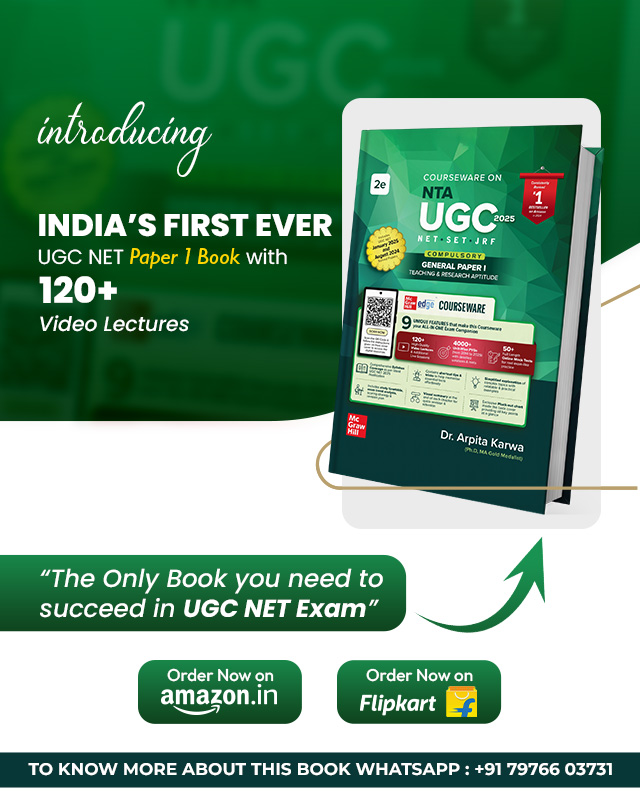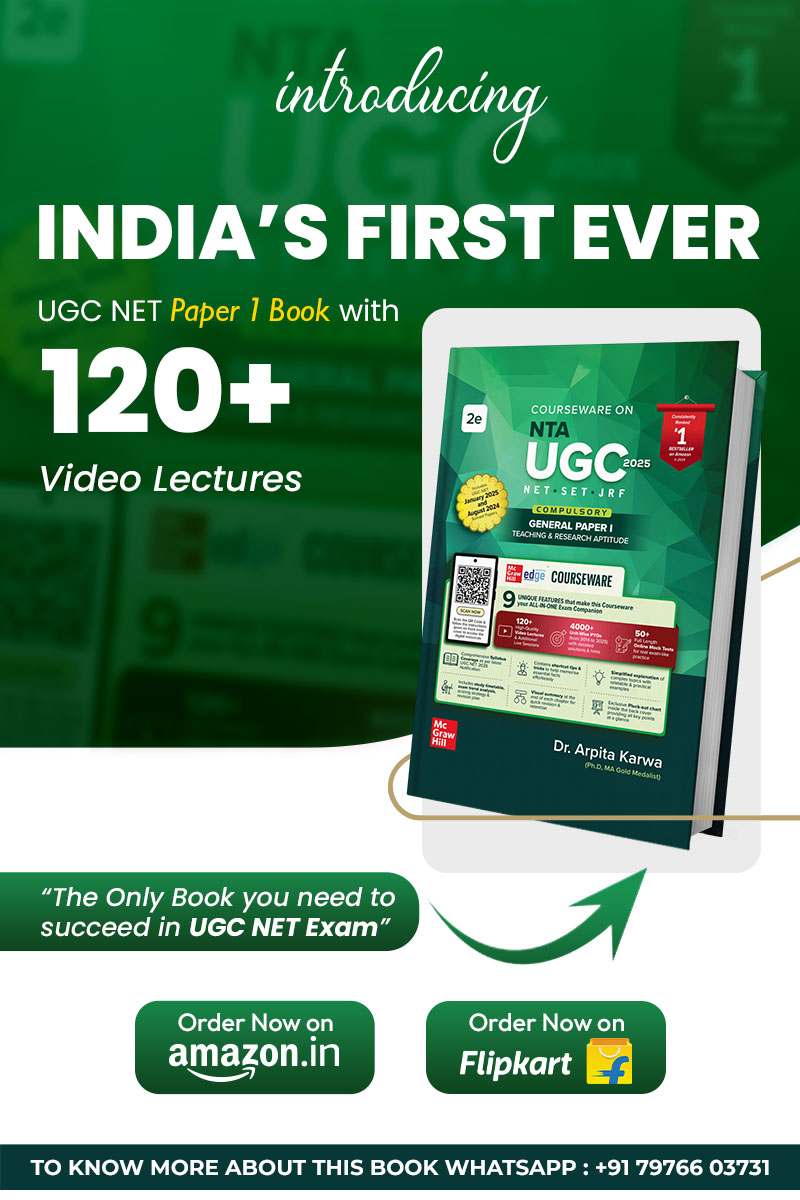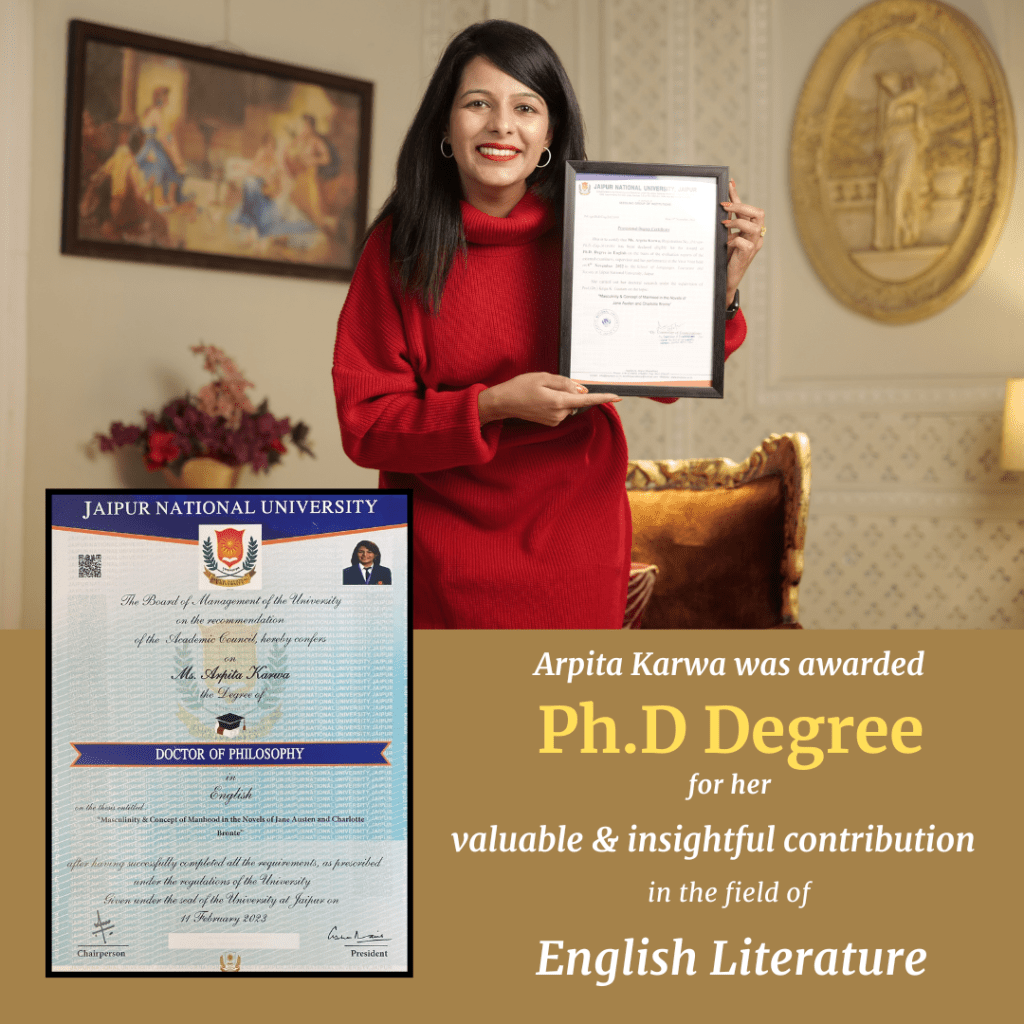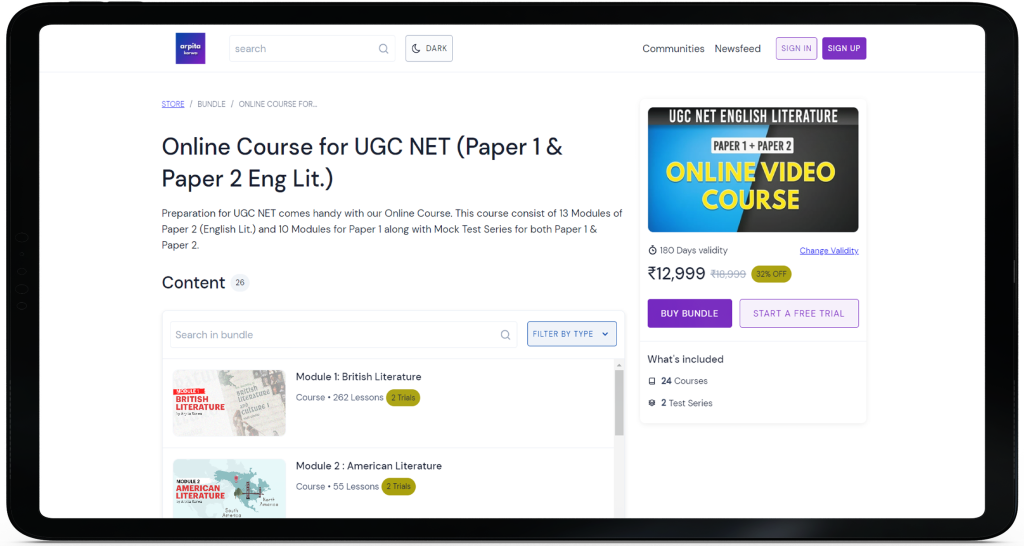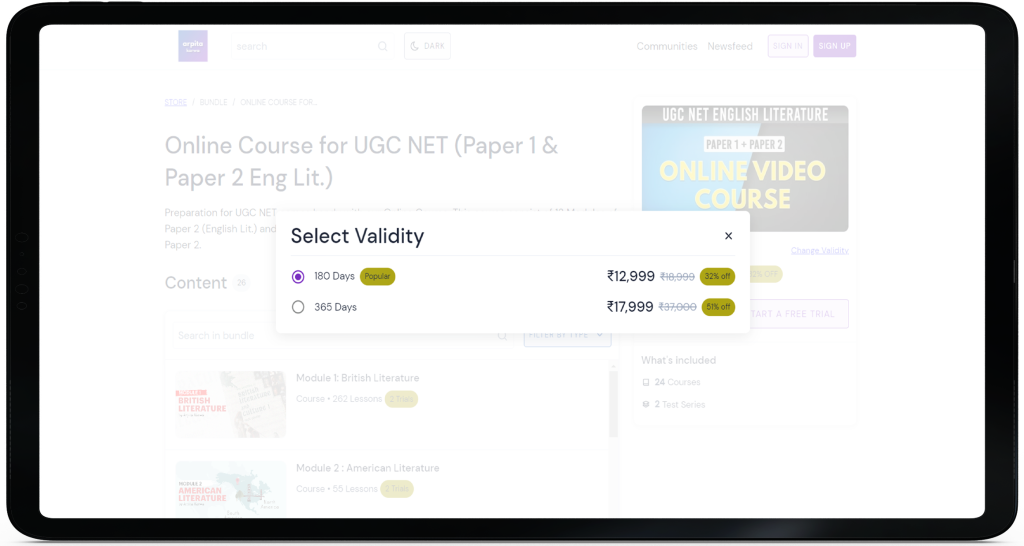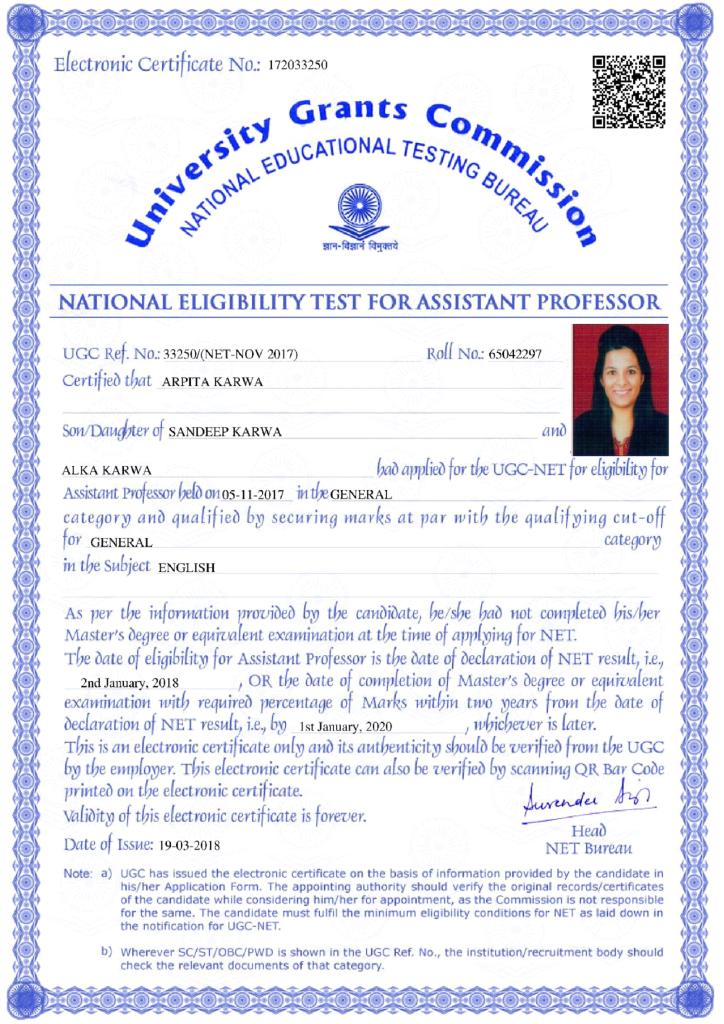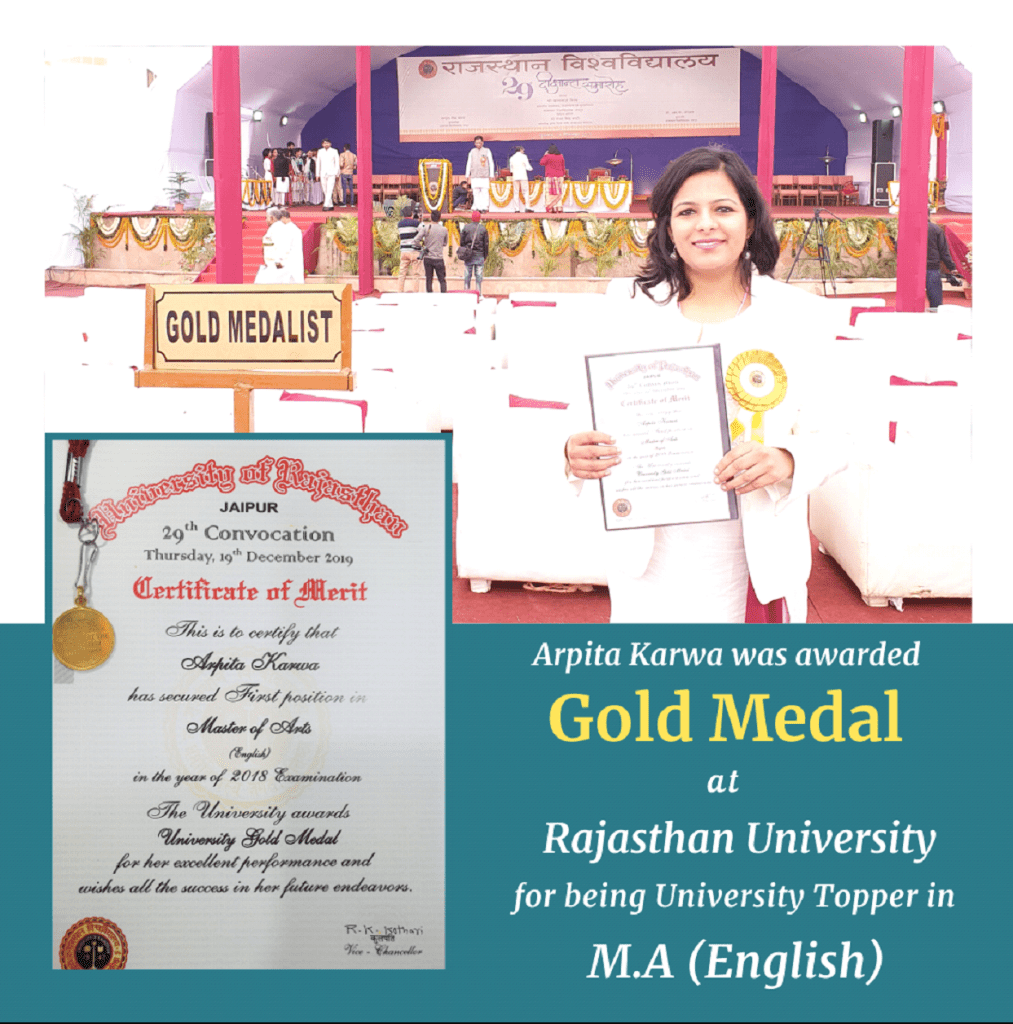Rajasthan Set 3
June 20, 2023 2023-12-18 16:14Rajasthan Set 3
Rajasthan Set 3
Q.1) Wordsworth in the sonnet “The World is Too Much with Us” is becoming the
(1) Gains of material progress
(2) Loss of sensitivity to one’s past
(3) Survival of the fittest
(4) Erasure of childhood experiences
Q.2) How many sonnets did Shakespeare write in all?
(1) 156
(2) 154
(3) 155
(4) 164
Q.3) Which is not one of reasons that prevented the Duke from talking directly to his wife in Browning’s “My Last Duchess”?
(1) He claims he didn’t have the “skill/in speech” to explain what he wanted from her
(2) He suggests she might have resisted being lessoned
(3) She would have burst out crying which he could not tolerate
(4) She might make excuse for her behaviour
Q.4) What fault does the Duke of Ferrara not accuse his wife of in Browning’s “My Last Duchess”
(1) She smiled at everyone
(2) She was too easily pleased
(3) She thanked everyone much the same as she thanked him
(4) She was not happy with him
Q.5) Who is Proteus on the basis of the poem “The World is Too Much with Us”?
(1) Prime Minister of England
(2) A Stock broker
(3) A Roman Emperor
(4) A Sea God
Q.6) In line 10 of “Let me not to the marriage of true minds” the word compass means?
(1) An instrument for finding direction
(2) A round circular course
(3) An accomplishment
(4) Range or reach
Q.7) Who is the protagonist of “Train to Pakistan”?
(1) Hukum Chand
(2) Jugga
(3) Iqbal
(4) Lambardar Banta Singh
Q.8) We come to know Michael Henchard’s age at the beginning of the novel The Mayor of Casterbridge, when………
(1) He tells the funnily woman that he is of age
(2) He agrees to sell his wife to the sailor
(3) He places his hand on the Bible and Pledges not to drink for twenty one years
(4) He is elected the mayor of Casterbridge
Q.9) On what day do young Catherine and Hareton plan to get married?
(1) New Year’s Day
(2) The Ides of March
(3) The anniversary of Heathcliff’s death
(4) Valentine’s day
Q.10) Which of the following novels opens with the lines “One evening of late summer, before the nineteenth century had reached one-third its span “
(1) Wuthering Heights
(2) Oliver Twist
(3) The Mayor of Casterbridge
(4) The Untouchable
Q.11) When does the narrator time the monologue in Browning’s poem “Porphyria’s Lover”?
(1) Just before the murder
(2) As he is strangling her
(3) Just after her death
(4) During her funeral
Q.12) Keats visualizes that the reaper ‘sound asleep’ in ‘Ode to Autumn because of……
(1) The heat of the mature sun is
(2) The drowsiness caused by the scent of poppies
(3) Tiredness and fatigue from hard work
(4) Half the work being complete
Q.13) “Glory be to God for dappled things what does dappled’ mean here?
(1) Fickled
(2) Spotted in varied colours
(3) Dazzling
(4) Useful
Q.14) “Please, Sir, I want some more” What is Oliver asking for and where in the novel Oliver Twist?
(1) A second bowl of the thin gruel, the parish work house
(2) A few pennies: at Fagin’s
(3) Books; at Brownlow’s
(4) Space to sleep; in coffin maker’s shop
Q.15) Wordsworth had opined in his Lyrical Ballads poetry is an overflow of emotions recollected in tranquility Which lines in the poem “The Solitary Reaper” attest to this?
(1) Stop here or gently pass
(2) Numbers flow/for old far-off things
(3) In my heart I bore/long after it was heard no more
(4) I listened, motionless and still
Q.16) Dome’s poem ‘The Flea has a triple symmetry-three protagonists, three stanzas and
(1) Three accusations
(2) Three denials
(3) Three couplets
(4) Three Questions
Q.17) What eventually happens to the dead crewmen in the poem “The Rime the Ancient Mariner?
(1) They drop down and their souls fly past
(2) They come alive to curse the Mariner
(3) The Mariner throws them out of the ship
(4) The Mariner takes them abroad and buries them
Q.18) What is the peculiar characteristic of the poem “Goodbye Party to Miss Pushpa TS” by Nissim Ezekiel?
(1) Its pleasant tone
(2) Its sentimentality
(3) Its use of English
(4) Its diversions
Q.19) That moment she was mine, mine, fair Perfectly pure and good: I found a thing to do ” In these lines from Browning’s Porphyria’s Lover what does the lover do?
(1) He looks into her eyes to ascertain her love
(2) Her bares her shoulder to lay his head on it
(3) He wounds her hair three times around her neck
(4) He asks her if she loves him not
Q.20) In “So long lives this” the last line of shall I compare thee this alludes to:
(1) The sonnet
(2) Nature’s season
(3) The beauty of the fair
(4) The buds of May
Q.21) Where dos the ‘negotiation’ for a second wife take place in My Last Duchess” by Robert Browning in the first part of the poem?
(1) In the garden where the cherries grow
(2) In the Duke’s private art gallery
(3) In Fra Panadolf’s studio
(4) In an ante-chamber of the castle
Q.22) The imagery in Kear’s Ode to Autumn’ moves from:
(1) Close at hand to a distance
(2) Known to unknown lands
(3) Spring to winter
(4) Conspiracy to celestial endeavor
Q.23) The “Pied Beauty by Gerald Manley Hopkins is a Curtal Sonnet, why is it so called?
(1) Since the fourteen lines have been curtailed
(2) Because it curtains the theme of the poem
(3) As it depicts messages onomatopoiely
(4) Because each line is shortened in metre
Q.24) Who among the following poets is known for his Hellenic spirit?
(1) P B Shelley
(2) John Milton
(3) John Keats
(4) Lord Byron
Q.25) “And sacrilege, three sins in killing three’ What does Sacrilege’ mean here in the above line?
(1) Righteousness
(2) Piety
(3) Obscene
(4) Desecration
Q.26) Who, in the novel The Mayor of Casterbridge, writes a will that “no flower be planted on my grave and that no man remember me”?
(1) Lucetta
(2) Susan
(3) Newson
(4) Henchard
Q.27) What destination does the young Catherine have in mind when she leaves Thrushcross Grange for the first time?
(1) Wuthering Heights
(2) London where her cousin Linton lives
(3) The nearby village
(4) The fairy caves at Penistone Crags
Q.28) In stanza 2 of the “Solitary Reaper” Wordsworth marks two comparisons They are with
(1) The Nightingale and the Cuckoo
(2) Arabian sands and Hebrides
(3) Notes and trillings
(4) Shade and silence
Q.29) Henchard in the novel The Mayor of Casterbridge says, “See now how it’s ourselves that are ruled by the powers above us! We plan this, but we do that” This shows that the novel is governed by the philosophy of
(1) Existentialism
(2) Pessimism
(3) Determinism
(4) Laissez-faire
Q.30) How many hours did rain pour down in “The Night of the Scorpion?
(1) Ten
(2) Twelve
(3) Eight
(4) Nine
Q.31) Where was Heathcliff originally picked up by Earnshaw?
(1) Buckinghamshire
(2) Liverpool
(3) Southampton
(4) Edinburgh
Q.32) What is the subtitle of the poem “My Last Duchess”?
(1) Fra Pandolf
(2) Claus of Innsbruck
(3) Ferrara
(4) Lucrezia de Medici
Q.33) By using “Stolen on his wing in line two of “On His 23 Birthday” Milton is using the poetic device of
(1) Hyperbole
(2) Metaphor
(3) Personification
(4) Onomatopoeia
Q.34) The sub title of Kubla Khan is
(1) A vision in a Dream A fragment
(2) A vision fragment
(3) A vision and Fragment
(4) A fragment of vision
Q.35) Seven Sleepers’ den’ in Domme’s The Good Morrow is an allusion to
(1) A moral indictment
(2) A superstitious belief
(3) An English folk tale
(4) A religious parable
Q.36) Who does adopt Oliver Twist in the end of the novel?
(1) Bill Sikes
(2) Fagin
(3) Mr Brownlow
(4) Jack Dawkins
Q.37) How much was Michael Henchard willing to offer if Donald Farfrae agreed to stay back as his manager in Hardy’s The Mayor of Casterbridge’?
(1) Half of his business
(2) Half of the profits
(3) Farfrae could name his own terms
(4) A third share in his business
Q.38) Emily Bronte published Wuthering Heights under the pseudonym……
(1) Ellis Bell
(2) Mary Westmacott
(3) Ayn Rand
(4) Ellis Peters
Q.39) “Cruel and Sudden, hast thou since Purpled thy nail, in blood of innocence?”
The above lines occur in the poem?
(1) Food Morrow
(2) Flea
(3) My Last Duchess +
(4) Kubla Khan
Q.40) ‘Light’ in ‘On His Blindness’ alludes to Milton’s loss of sight However it also symbolically suggests:
(1) An inner glow
(2) Wisdom
(3) Goal in life
(4) Diminishing of faith
Q.41) The Mayor of Casterbridge” has the background of
(1) Essex
(2) Sussex
(3) Wessex
(4) Northampton
Q.42) The real name of “The Artful Dodger in Dickens’ Oliver Twist is:
(1) Fagion
(2) Bill Sikes
(3) Noah Claypole
(4) Jack Dawkins
Q.43)”You can do nothing to help me I am past all hope” Who says this in the novel Oliver Twist?
(1) Nancy
(2) Rose
(3) Oliver
(4) Monks
Q.44) William Wordsworth was on the itinerary of a neighboring country and he wrote an experience thereof in his poem “The Solitary Reaper’ Which was the country he went to?
(1) Ireland
(2) Scotland
(3) Netherland
(4) France
Q.45) The progression of thought in John Dome’s ‘The Flea’ follows a logic which can be described as
(1) Description, argument, antithesis
(2) Narration, resolution, achievement
(3) Argument, exemplification, attainment
(4) Denial, acceptance, agreement
Q.46) At the end of the play Doll’s House Nora……
(1) Reconciles with Torvald
(2) Commits suicide
(3) Leaves Torvald
(4) Kills Torvald
Q.47) What gift does Mr Singh give Bakha in Mulk Raj Anand’s The Untouchable?
(1) A football
(2) A cricket bat
(3) A hockey stick
(4) Candies and cigarettes
Q.48) The sonnet “On his 23″ Birthday” symbolizes the poet’s:
(1) Journey from doubt to self-discovery
(2) Experiences a poet
(3) Coming to maturity
(4) Sinking into pathos
Q.49) Keats’ poem-“To Autumn has a stanzaic structure of
(1) Eight lines
(2) Nine lines
(3) Ten lines
(4) Eleven lines
Q.50) What was inscribed above the entrance of Wuthering Heights?
(1) Hindley Earnshaw, 1729
(2) 1623
(3) Abandon all hope, ye who enter here
(4) Hareton Earnshaw, 1500
Q.51) The subtitle of Charles Dicken’s Oliver Twist is:
(1) The Children’s Crusade
(2) The Parish Boy’s Progress
(3) The Boy Who Wouldn’t Grow up
(4) A Provincial Life
Q.52) What according to Nora would be the ‘Greatest miracle of all in the Doll’s House?
(1) Torvald taking responsibility for Nora’s action
(2) Torvald giving credit to women’s role in society
(3) Krogstad not asking Nora to repay the loan
(4) Nora’s father bringing her up as an equal
Q.53) “Every fair from fair” (line 7) in “Shall I compare thee… means:
(1) The young maidens sense of justice
(2) The beauty of everything beautiful
(3) Exhibition of beauty versus natural beauty
(4) From time to time
Q.54) Mitton in his sonnet “On his Blindness” dramatizes the poem with his use of
(1) Metaphors
(2) Autobiography
(3) Dialogue
(4) Reflection
Q.55) Who is ‘the subtle thief of youth in the poem ‘On His 23″ Birthday?
(1) Devil
(2) God
(3) Time
(4) Angel
Q.56) “Heard melodies are sweet, but those unheard are sweeter” Which figure of speech is used in the above line?
(1) Understatement
(2) Pun
(3) Paradox
(4) Hyperbole
Q.57) “My hasting days fly on with full career” What does the word “full career here refer to?
(1) Peak to talent
(2) Messenger
(3) Full speed
(4) Poetic career
Q.58) Which of the following is an example of “dead metaphor”?
(1) The Head of a Department
(2) Your room is a Kennel shadow
(3) Life is but a walking
(4) Blind mouths
Q.59) Anaphora is
(1) Contradictory statement
(2) The use of an epithet for a proper name
(3) The repetition of the same word or phrase at the beginning of two or more lines
(4) When the speaker stops in the middle of his speech to create a certain effect
Q.60) “Oh stay, three lives in one flee spare,
Where we almost, nay, more than married are”
Which figure of speech is used here in the above lines?
(1) Conceit
(2) Understatement
(3) Equivocation
(4) Pun
Q.61) “The ploughman homeward plods his weary way”!
Which figure of speech is used in the above line?
(1) Synecdoche
(2) Metonymy
(3) Transferred Epithet
(4) Circumlocution
Q.62) Which literary movement led writers not to imagine life as it could be, but to examine life as it was actually lived?
(1) Rationalism
(2) Realism
(3) Romanticism
(4) Determinism
Q.63) Which was the movement that used incongruous imagery, subtlety of thought and ingenious comparisons in their poetry?
(1) Magic realism
(2) Dystopian
(3) Metaphysical
(4) Naturalism
Q.64) Which figure of speech is used in the following line?
“Sometimes too hot the eye of heaven shines”
(1) Metaphor
(2) Hyperbole
(3) Simile
(4) Anaphora
Q.65) With which movements were Dante Gabriel and Christina Rossetti associated?
(1) Pre-Raphaelite
(2) Transcendental
(3) Verismo
(4) Socialist Realism
Q.66) Which movement in English Literature thrived between 1660 and 1798?
(1) Reformation
(2) Cavalier
(3) Neo-classical
(4) Pre Romantic
Q.67) “Early in the morning was woken up by the cock-a-doodle-do of the rooster” Which figure of speech is being used here?
(1) Assonance
(2) Onomatopoeia
(3) Hyperbole
(4) Personification
Q.68) Which literary movement was initiated by Horace Walpole?
(1) Pre-Raphaelite
(2) Gothic
(3) Decadent
(4) Futurism
Q.69) “So the whole ear of Denmark
Is by a forged process of my death Rankly abused”
Which figure of speech is being used in these lines from Hamlet?
(1) Synecdoche
(2) Personification
(3) Hyperbole
(4) Parable
Q.70) Comus, The Fairy Queen, Venus and Adonis are examples of which literary form?
(1) Melodrama
(2) Menippean satire
(3) Masque
(4) Monologue
Q.71) A prose fiction that depicts the adventures of a roguish but appealing hero who lives by his wits in a corrupt society is
(1) Post Modernism
(2) Protologism
(3) Picaresque
(4) Platonic idealism
Q.72) “Alone together’ and ‘Growing smaller’ are examples of which figure of speech?
(1) Hyperbole
(2) Oxymoron
(3) Anagram
(4) Tautology
Q.73) The philosophy of the Oxford Movement was known as:
(1) Newmanitism
(2) Paseyitism
(3) Tractarianism
(4) Apostolicism
Q.74) The adherents of which movement seek to overcome the contradictions of the conscious and the unconscious minds by creating unreal or bizarre stories full of juxtapositions?
(1) Gothic
(2) Surrealism
(3) Freudianism
(4) Psychosis
Q.75) Which movement is connected to the slogan “Art for arts’s sake”?
(1) Pre-Raphaelite
(2) Ibsenism
(3) Existential
(4) Aesthetic
Q.76) The Oxford movement was essentially
(1) A rationalist movement
(2) A literary movement
(3) A religious movement
(4) A movement for democracy
Q.77) A thought to Donne was an experience; it modified his sensibility Who has said this?
(1) Dryden
(2) T S Eliot
(3) Dr Johnson
(4) H Grierson
Q.78) Who said “Imagination may be compared to Adam’s dream, he awoke and found it true
(1) S T Coleridge
(2) John Keats
(3) F R Leavis
(4) P B Shelly
Q.79) Custom is the most certain mistress of language. Who has written this?
(1) Mathew Arnold
(2) Dr. Johnson
(3) Ben Johnson
(4) Sir Philip Sidney
Q.80) By objective correlative’ Eliot means
(1) Correlation between different poets
(2) Correlation between different poems
(3) A literary technique to evoke a particular emotion by means of symbol
(4) Comparison and contrast in an objective way
Q.81) Where does Mathew Arnold talk of Wordsworth’s “healing power and his strength to “make us feel”?
(1) In his essay “Wordsworth”
(2) In Memorial Verses April 1850
(3) In “The Study of Poetry”
(4) In Essays in Criticism
Q.82) “The only way of expressing emotion in the form of art is by finding a set of objects, a situation, a chain of events which shall be the formula of that particular emotion” T S Eliot is here talking of his views on… in his essay………
(1) Unified sensibility: “The Metaphysical Poets”
(2) Individual Talent: Tradition and “Individual Talent”
(3) Programmatic Criticism: The Second-Order Mind
(4) Objective correlative: “Hamlet and his problems”
Q.83) “All conventions and affections of pedantry must be discarded in order to evolve the true poetic style, which should not only be simple, but unaffected”
The above line occurs in
(1) Preface to lyrical ballads
(2) Literary criticism
(3) The Study of poetry
(4) Practical criticism
Q.84), G Wilson Knight opines that character is merely a role that we play Who according to the critic goes deeper than character and depicts our true self, our fundamental nature?
(1) Christopher Marlowe
(2) Ben Jonson
(3) Shakespeare
(4) John Milton
Q.85) LA Richards coined a “term synaesthesis’ which according to him meant:
(1) Feeling of impersonality
(2) Rivalry of conflicting impulses
(3) Development of purgation theory
(4) Harmony and equilibrium of our impulses
Q.86) In which critical work of his does Cleanth Brooks argue for the centrality of “ambiguity and Paradox?
(1) Understanding Poetry
(2) The Well-wrought Urn Studies in the Structure of Poetry
(3) Modern Poetry and the Tradition
(4) An Approach to Literature
Q.87) Which among the following is not a Modernist critic?
(1) T S Eliot)
(2) Fredric Jameson
(3) Stephen Greenblatt
(4) Ezra Pound
Q.88) “The Laugh of Medusa’ a feminist essay is written by:
(1) Simone de Beauvoir
(2) Helene Cixous
(3) Luce Irigaray
(4) Julia Kristeva
Q.89) Skepticism towards ‘grand narratives’ is a characteristic of which critical approach?
(1) Modernism
(2) Post-modernism
(3) New Historicism
(4) Cultural Materialism
Q.90) What according to Derrida is not a part of the definition of ‘Diffe’ rance’?
(1) Synchrony and Diachrony
(2) Unavoidability of context
(3) Differentials between what is signified
(4) Authorial intent
Q.91) Paul Gilroy, William Safran, Robin Cohen and Sudesh Mishra are associated with:
(1) New Historicism
(2) Migration and Diaspora studies
(3) Third-wave Feminism
(4) Post-Structuralism
Q.92) -When I offered the word “… ” Many years ago, it was to give us a tool to use, as feminist women of colour ” Which word is Alice Walker referring to?
(1) Feminism
(2) Gynocriticism
(3) Colour Purple
(4) Womanism
Q.93) “Classic criticism has never paid any attention to the reader for it, the writer is the only person in literature we know that will give writing its future, it is necessary to overthrow the myth “who says this in which text?
(1) LA Richards: “Principles of Literary Criticism”
(2) Stanley Fish: “I there a Text in this Class”?
(3) Roland Barthes: “The Death of the Author”
(4) Louise Rosenblatt: “Literature as Exploration”
Q.94) Which among the following is not a book written by Michel Foucault?
(1) Madness and Civilization
(2) The Order of Things
(3) Of Grammatology
(4) Discipline and Punish
Q.95) Which among the following is not one of the notable concepts propounded by Mikhail Bakhtin?
(1) Jouissance
(2) Heteroglossia
(3) Dialogism
(4) Carnivalesque
Q.96) Who posited that the human psyche is framed within the Imaginary, the Symbolic and The Real (RSI)?
(1) Fredric Jameson
(2) Jacques Lacan
(3) Sigmund Freud
(4) Carl Gustav Jung
Q.97) “An utterance has meaning only in the context of a pre-existent system of rules and conventions” This Quote by Jonathan Culler attests to his views
(1) Structuralist
(2) Post-colonial
(3) Modernist
(4) Postmodernist
Q.98) Which one of the following books is not by Elaine Showalter?
(1) A Literature of their Own
(2) The Female Malady: Women Madness, and English Culture
(3) Mad Woman in the Attic:
(4) Sexual Anarchy: Gender at Culture at the Fin de Siecle
Q.99) Black Skin, White Masks and The Wretched of the Earth are books by… which deal with the… theoretical discourse
(1) Chinua Achebe: Post Modernity
(2) Frantz Fanon; Post-Colonial
(3) Edward Said; Orientalism
(4) Salman Rushdie: Imaginary Homelands
Q.100) Judith Butler, a gender theorist and third wave feminist is known for her contribution to the ideas of
(1) Feminine, feminist and female
(2) Gender as social construction and gender performativity
(3) Ethics of ambiguity
(4) The Feminine Mystique
Q.101) Pastiche and allusion are both mechanisms in
(1) Intertexuality
(2) Identity Formation
(3) Subalternism
(4) Grammatology
Q.102) The Affective Fallacy concerns the supposed error of judging or evaluating a text on the basis of
(1) The writer’s pursuit of a vision of artistic beauty
(2) The author’s intention
(3) Emotional effects on the reader
(4) Separating intellectual thought from experience of feeling
Q.103) Literary theory refers to hypothesis that reveal what literature can mean and literary criticism
(1) The criticism of literature texts
(2) Is to find what is common in all literature
(3) Is to seek differences in genres
(4) The study, analysis, evaluation and interpretation of literature
Q.104) New Critics’ did not focus on:
(1) The text
(2) Author’s biography and intention
(3) Historical and cultural
(4) Reader’s response
Q.105) Of which two requirements in a poet does Horace say that “so much does the one require the assistance of the other, and so amicably do they conspire to produce the same effect, what are they?
(1) Natural gift and the rigours of art
(2) Consistent industry and an awesome master
(3) An innate genius and capability of display
(4) Chiseling and honing ability without talent
Q.106) In what ways does Aristotle differentiate between various art forms?
(1) On the basis of manner of imitation, artist and era
(2) By the medium, objects and manner of imitation
(3) According to the age, objects and tools
(4) According to artist, artistic effort and artist’s agd in which he wrote
Q.107) “It is not rhyming and versing that maketh a poet” said Sir Philip Sidney So what according to him makes a poet?
(1) Study of nature and its imitation as it is
(2) Study of nature and its faithful depiction
(3) Study of nature and creating it as more beautiful than the real
(4) Study of nature and its servile imitation
Q.108) “To judge of poets is only the faculty of poets and not of all poets ” Said Ben Jonson But not all poets could do so, according to him Then which poets did?
(1) Those who had a long history of writing
(2) The best
(3) The most critical of others
(4) Those who had studied the craft well
Q.109) Longinus explained sublime as…
(1) Something more than what is good for instruction and delight
(2) Something that moves the soul and uplifts the spirit
(3) Something that is a valuable treatise on men and morals
(4) A certain destination and consummate excellence in expression
Q.110) In whose work did Pope find unequalled fire and rapture”?
(1) Aristotle
(2) Homer
(3) Virgil
(4) Horace
Q.111) Who said this and where:
“The work of a correct and regular is a garden accurately formed and diligently planted varied with shades and scented with flowers”
(1) John Dryden-Essay on Dramatic Poesy
(2) Alexander Pope-Essay on Criticism
(3) Samuel Johnson – Preface to Shakespeare
(4) F R Lewis-New Bearings in English Poetry
Q.112) According to Dryden criticism as it was first instituted by Aristotle was meant as setting up standard of judging well, its business was not principally?
(1) Compare writers
(2) To preach goodwill
(3) To find fault
(4) To favour Greek writers
Q.113) Poetry “Awakens and enlarges the mind itself by rendering it the receptacle of a thousand unapprehended combinations of thought” Who said this and where?
(1) Walter Pater, Appreciations
(2) Mathew Arnold, The Study of Poetry
(3) John Keats, in a private letter to George and Thomas
(4) P B Shelley, A Defence of Poetry
Q.114) “And then my heart with pleasure fills
And dances with the daffodils”
& “The music in my heart I bore Long after it was heard no more”
These lines from Words worth are examples of which theoretical percept of the poet?
(1) Humble and rustic life was generally chosen because in that condition the essential passions of heart find a better soil
(2) Poetry is the spontaneous overflow of powerful feelings, it takes its origin from emotion recollected in tran Q.uility
(3) Poetry is the breath and finer spirit of knowledge
(4) The best portion of a good man’s life: his little, nameless unremembered acts of kindness and of love
Q.115) In the first sentence of The Great Tradition F R Lewis does not mention which one of the novelists who he regards as “great”?
(1) T S Eliot
(2) Jane Austen
(3) Henry James
(4) Joseph Conrad
Q.116) “We hate poetry that has a palpable design on us… Poetry should be great and unobtrusive ……..
Where did Keat’s say this?
(1) “On the Aims of Poetry Letter to J H Reynolds
(2) “On Negative Capability”: Letter to George and Tom Keats
(3) On the Imagination and “a Life of Sensations rather than Thoughts: Letter to Benjamin Bailey
(4) On Shakespeare and “Eternal Poetry” Letter to JH Reynolds
Q.117) In ‘Ode on a Grecian Urn Keats tells is that the Um is historian who can narrate
(1) Flowery tales
(2) Leaf fring’d legends
(3) Stories of Tempe and Arcady
(4) What transpires in a sacrifice
Q.118) What does the narrator in Kubla Khan’ profess to do if he could revive the symphony and song of the damsel?
(1) Lure his listeners magically
(2) Build the dome in air
(3) Attain paradise
(4) Play the dulcimer himself
Q.119) In order to counter ‘Despair’ what does the narrator in ‘Carrion Comfort’ attempt to do?
(1) Pray
(2) Cry
(3) Hope
(4) Choose
Q.120) What kind of a place was it where the ‘stately pleasure dome was decreed in Coleridge’s poem, “Kubla Khan?
(1) Measureless
(2) Paradise
(3) Savage
(4) Abyssinian
Q.121) Which of the following poem ends with the line “God has not said a word”?
(1) “The Night of the Scorpion”
(2) “Flea”
(3) “Carrion Comfort”
(4) Porphyria’s Lover
Q.122) What is backdrop of Train to Pakistan”?
(1) Gujrawala
(2) Mano Majra
(3) Abohar
(4) Bhinderwala
Q.123) The last four lines of ‘Kubla Khan’ are a clear indication of Coleridge’s
(1) Indebtedness to Milion
(2) Religiosity
(3) Spiritualism
(4) Super nationalism
Q.124) The poetic device that Hopkins uses in the first few lines of ‘Carrion Comfort while addressing ‘Despair’ is
(1) Apostrophe
(2) Refrain
(3) Calligram
(4) Metaphor
Q.125) “Rime of the Ancient Mariner” is
(1) A lyric
(2) A heroic poem
(3) A ballad
(4) An elegy
Q.126) “It all came from his belief that the only absolute truth was death” This fatalistic line refers to… in Train to Pakistan
(1) Hukum Chand
(2) Banta Singh
(3) Imam Baksh
(4) Jugga
Q.127) “We are meeting today to wish her bon voyage”What is meant by “bon voyage”?
(1) To wish good luck for journey
(2) To wish for a sea-journey after hardships
(3) To avoid a sea-journey
(4) To officially apply for a sea-journey
Q.128) In Ezekiel’s poem “Goodbye party for Miss Pushpa T S ” What is the order of events in the farewell event?
(1) Narrator speaks, others speak and miss Pushpa sums up
(2) Narrator speaks Miss Pushpa thanks, others speak
(3) Inauguration, key speaker, vote of thanks
(4) Narrator introduces Miss Pushpa Miss Pushpa describes her stay in the office
Q.129) The phrase “sordid boon’ in the poem “The World is too much with us” is a/an_
(1) Hyperbole
(2) Oxymoron
(3) Euphemism
(4) Synecdoche
Q.130) Match the following novels with the characters who figure in them:
List I
(A) Wuthering Heights
(B) Doll’s House
(C) The Untouchable
(D) Train to Pakistan
List II
(1) Rank
(2) Sohini
(3) Nooran
(4) Lockwood
Codes:
A. (a)-4, (b)-1, (c)-2, (d)-3
B. (a)-3, (b)-4, (c)-1, (d)-2
C. (a)-2, (b)-3, (c)-4, (d)-1
D. (a)-1, (b)-2, (c)-3, (d)-4
Q.131) In the beginning of the poem “Pied Beauty how many things that Hopkins recounts aredappled”?
(1) 3
(2) 4
(3) 2
(4) 5
Q.132) The incident of ‘Wife auction’ takes place in
(1) Jude the Obscure
(2) The Mayor of Casterbridge
(3) The untouchable
(4) Wuthering Heights
Q.133) What is the name of the hockey player in ‘Untouchable”?
(1) Charat Kumar
(2) Charta Ram
(3) Charan Singh
(4) Charat Singh
Q.134) What does Keats mean by O Attic shape’ when he addresses the urn in his poem “Ode on a Grecian Urn”?
(1) Because the urn is housed in an attic
(2) Because of its static nature
(3) Because it relates to Greece
(4) Because it depicts legends
Q.135) Where is Mulk Raj Anand’s novel The Untouchable set?
(1) In Jammu
(2) In Bulashah
(3) In Bulandshahar
(4) In Bhatinda
Q.136) The poem “The Good Morrow” by Donne has 21 lines and is divided into three sets that conform to a rhyming pattern of
(1) abacabe
(2) aaabbbc
(3) ababece
(4) abababe
Q.137) Match the following novels with the most predominate elements depicted in them:
List I
A Wuthering Heights
B Train to Pakistan
C Doll’s House
D The Mayor of Casterbridge
List II
1 Determinism
2 Feminism
3 Gothic
4 Historical
Codes:
A. (a)-3, (b)-4, (c)-2, (d)-1
B. (a)-4, (b)-3, (c)-1, (d)-2
C. (a)-1, (b)-2, (c)-3, (d)-4
D. (a)-2, (b)-1, (c)-4, (d)-3
Q.138) The poem-Carrion Comfort deals with
(1) Spiritual struggle within Rance
(2) Depression and despair
(3) Glory of angles
(4) A blacksmith
Q.139) Match the genre with the poem:
(A) Ancient Mariner
(B) My Last Duchess
(C) To Autumn
(D) Night of Scorpion
(1) Ode
(2) Dramatic Monologue
(3) Ballad
(4) Narrative Poem
Codes:
A. (a)-4, (b)-1, (c)-2, (d)-3
B. (a)-3, (b)-2, (c)-1, (d)-4
C. (a)-1, (b)-3, (c)-4, (d)-2
D. (a)-2, (b)-4, (c)-3, (d)-1
Q.140) A Doll’s House’ is based on the real-life incidents of a fellow novelist of Ibsen Who was she?
(1) Nora Keiler
(2) Laura Keiler
(3) Kristine Keiler
(4) Anne Marrie
Q.141) Which of the following names is not the one used by Torrald for Nora in the Doll’s Ho
(1) Little squirrel
(2) Little Miss Extravagant
(3) Mousie
(4) Little Lark
Q.142) What medicine did the father in Night of the Scorpion by Nissim Ezekiel not use to curb the mother from the poison?
(1) Every curse and blessing
(2) The services of medical PR actioners
(3) Powder, mixture, herb
(4) Paraffin on the toe and flamed it
Q.143) Match the following novels with the places they are set in
(A) Doll’s House
(B) Wuthering Heights
(C) Major of Caster bridge
(D) Oliver Twist
(1) Yorkshire Moors
(2) Fictional rural England
(3) Norwegian town
(4) London
Codes:
A. (a)-4, (b)-3, (c)-2, (d)-1
B. (a)-1, (b)-2, (c)-3, (d)-4
C. (a)-3, (b)-1, (c)-2, (d)-4
D. (a)-4, (b)-3, (c)-1, (d)-2
Q.144) Whom did Nils Krogstad love and failed to marry?
(1) Nora
(2) Anne Marrie
(3) Mrs Kristine Linde
(4) Emmy
Q.145) The villagers in Nissim Ezekiel’s poem “The Night of the Scorpion” prayed that:
(1) May her sufferings decrease
(2) May the misfortunes of her next birth be lessened
(3) May the sum of evil become diminished with her pain
(4) May they not be infected with her evil
Q.146) With what piece to hope does Bakha in The Untouchable return home at the end of the novel?
(1) That Mahatma Gandhi was going to free India
(2) That untouchability had ended
(3) That India would soon be free
(4) That India would soon get a flushing toilet
Q.147) What word words Bakha uses to warn people that an untouchable is approaching in Mulk Raj Anand’s The Untouchable
(1) Hat, Hatja
(2) Posh, keep away, posh
(3) Dur Dar raho
(4) Aya, aya, aya
Q.148) “Whatever our souls are made of his and mine are the same” Who says this of Emily Bronke’s Wuthering Heights?
(1) Isabella about Heathcliff
(2) Catherine of Edgar Linton
(3) Catherine about Heathcliff
(4) Catherine about Hareton
Q.149) “I have rescued you unscathed from the cruel talons of the hawk”
Who is “hawk’ here?(1) Nils Krogstad
(2) Rank
(3) Torvald Helmer
(4) Mrs Linde
Q.150) Who is the benefactor of Oliver Twist at the end of the Novel Oliver Twist?
(1) Rose Maylie
(2) Mr Brownlow
(3) Charley Bates:
(4) Monks






